The Chinese national football team hit the headlines this week when Alain Perrin was sacked as manager after 23 months in charge. A poor World Cup qualification campaign, which has seen two embarrassing goalless draws with Hong Kong and a limp 1-0 defeat in Qatar, has all but erased the memory of last January’s relatively successful Asian Cup campaign when the Chinese defied the expectations of many to make it through to the quarter-finals.
With there apparently being no immediate successor lined up and China effectively eliminated from the World Cup almost three years early (a miraculous run of results in other groups could still see them advance to the final round of qualification as one of the best runners-up if they win their last two games in March), it seems that the national game is at a crossroads. Was Perrin the victim of his own success by raising expectations to an unrealistic level a year ago in Australia, or did he simply get lucky down under and prove himself to a decidedly average manager in the subsequent year?
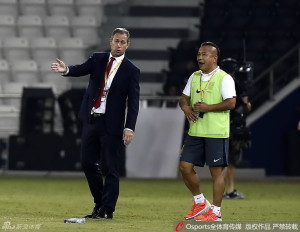
Perrin struggles for answers as China fall to defeat in Qatar
There is certainly a case to be made that China were supremely unfortunate not to beat Hong Kong in their first outing in September, but an overly defensive approach in Doha the following the month brought about a deserved defeat against a Qatar side that have proven to be far stronger than many anticipated. Then, with victory a must, Perrin sent his side out to face Hong Kong like a group of bishops during the crusades – armed with nothing but ineffective crosses.
Having also put on an average display at last August’s East Asian Cup and stubbornly chosen to leave out fan favourites Huang Bowen, Gao Lin and Zhang Xizhe for varying parts of his tenure, the writing was certainly on the wall for the former Portsmouth manager. There is no doubt that failing to advance out of a World Cup qualification group that looked easy on paper is a disaster for the Chinese national team, but there was always a danger that in amongst the likes of Japan, South Korea, Australia and Iran they were only ever going to make up the numbers in the final twelve anyway.
Sacking Perrin is by no means the wrong decision (although waiting two months to do so seems strange), but it does raise questions about the long term direction the Chinese national football team is taking. Fortunately, as an antidote to endless off-field chatter, we have some actual matches coming up that can tell us at least a little bit about the future of the Chinese game.
What is the AFC under-23 Asian Cup?
As the name infers, the AFC under-23 Asian Cup is a tournament for Asian national teams featuring players born on or after January 1st 1993. Like its big brother, held last year in Australia, it features sixteen teams split into four groups with the top two in each going through to the knockout stages.
After debuting in Oman in 2014, this is only the second edition of the competition and it is perhaps no surprise to learn that serial tournament bidders Qatar will be the hosts. In themselves, age limited tournaments don’t have much appeal beyond acting as developmental tools, but this competition has a very significant carrot at the end of its stick because it offers qualification to the Men’s Olympic Football Tournament in Rio.
In previous Olympic years, the AFC have held a specific qualifying tournament with group matches played on a home and away basis, but this time around the top three in this competition will earn the chance to compete in Brazil. It’s worth noting, of course, that while most of Europe doesn’t take Olympic football particularly seriously, it’s a bit deal in Asia and so the teams will be going all out to win.
The Manager
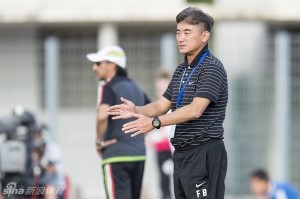
Under-23 manager Fu Bo roams the touchline during last summer’s Toulon Tournament
Fu Bo has been in charge of this age group since 2012 and will be looking to show signs of progress under his tenure. The 50-year-old actually served as caretaker senior team boss between Jose Antonio Camacho’s firing in the summer of 2013 and Perrin’s appointment the following February, and he could be in for a similar fate if his side performs well in this competition.
Fu has pretty much named as strong a squad as the age restrictions allow, with eighteen of the 23 players appearing regularly for their Super League clubs last season. Throughout 2015, the under-23s have featured strong line-ups in friendlies and mini-tournaments as they looked to hone themselves for Qatar and so Fu has no excuses when it comes to preparation. Based on recent games, the Chinese will probably line-up in a 4-1-4-1, although that could easily mutate into a 4-2-3-1.
The Team
After finally getting an extended first team run in the Super League this season, Tianjin TEDA’s Du Jia is likely to start in goal with Shanghai Shexin’s Zhang Yinuo and Portuguese based Yeerjieti Yeerzati providing the back up. Shi Ke is almost a lock to get the nod to start at centre back, and the mature Shanghai SIPG player is likely to be partnered by Shandong Luneng’s Wang Tong. Wang won his first senior cap as a right back during last year’s East Asian Cup and he could reprise that role should Fu choose Guangzhou R&F’s Jin Yanyang in the centre.
Jin could also play at right back, although Jiangsu Sainty Suning’s Zhang Xiaobin is a likely option there after being making himself a regular feature in the CFA Cup winners’ line-ups this season. Without much competition, Shandong Luneng’s Mi Haolun will probably start at left-back. Mi spent last season on loan with Shijiazhuang Ever Bright where he impressed as an attacking wing back, but the defensive side of his game still looks vulnerable.
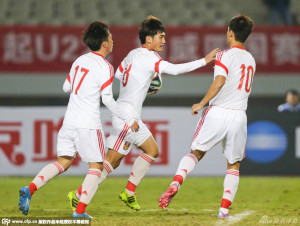
Liao Lisheng (8) celebrates scoring a penalty against Brazil in 2014
Xu Xin has suddenly exploded into the consciousness of Chinese football fans by signing for Guangzhou Evergrande from Atletico Madrid B, but the 21-year-old has been plying his trade for the under-23s for some time and will probably start in the holding midfield role. Should Fu opt to play with a double pivot or just not fancy Xu, the role could be taken up by Zhang Xiaobin, Zhao Yuhao or Guo Hao.
Hangzhou Greentown’s Zhao has played that position a few times under Fu since switching from right back, while Tianjin TEDA’s Guo has a nasty side to his game as he showed when he left a deep gash in the back of Dario Conca’s leg back in April. Evergrande’s Liao Lisheng has returned after a season blighted by injury and he could also partner a defensive midfielder, although he is more likely to play a little more advanced alongside Hangzhou’s Feng Gang. Feng’s club teammate Xie Pengfei could also be given a role as an attacking midfielder as could Evergrande’s other winter signing from Europe, Li Yuanyi.
Expect the wings to be the preserves of Shandong teammates Liu Binbin and Wu Xinghan. With his lightening pace, Liu is probably this squad’s best known player, a fact emphasised by him being the only one of this group to go to last year’s Asian Cup with the seniors. Wu certainly has a lot of potential, although he found himself the victim of Shandong’s loaded attack last season meaning his starting berths were largely given as a makeshift full back.
Liu and Wu will be backed up by R&F’s Chang Feiya, whose dribbling talents are still unmatched by his decision-making, and Yang Chaosheng who continued to improve last season in a second year on loan from Evergrande to Liaoning Whowin. Li Yuanyi and Tianjin’s Wang Qiuming can also play out wide.
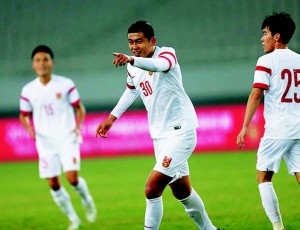
Striker Zhang Yuning (30) will be looking to make an impact in Qatar
Up front, all the hype coming into the tournament is about Vitesse Arnhem’s Zhang Yuning who made a major impact by scoring twice for the the under-23s in a four team tournament in Wuhan last November. At 19, Zhang is the youngest player in the squad and has somewhat amusingly been called China’s Didier Drogba because of his stocky physique (at least it make a change from Messi).
Should Zhang not get the nod or fail to live up to expectations, Yang Chaosheng, whose off the ball running impressed during a few stints up front during last summer’s unsuccessful Toulon Tournament, provides a solid alternative. Xie Pengfei can also play as a striker.
Unsurprisingly given the reputation of their youth programme, Shandong are the most represented club with five players, although one of them, Chen Zhechao, has only just been brought in after a spell in Portugal. The purchases of Xu Xin and Li Yuanyi means that Evergrande have four players in the squad, while Hangzhou and Tianjin have three.
In fact, though, the youth revolution which Hangzhou have implemented over the last few seasons is showing serious signs of bearing fruit as Shi Ke and Zhang Yuning have both left the club over the last year, meaning five of this squad were developed in Zhejiang. SIPG, R&F and Jiangsu are all represented, while the versatile Yang Kuo also means Henan Jianye have a player in the squad.
Two of the 23 are currently European based while one, goalkeeper Zhang Yinuo, will, barring a transfer, play in League One next season after getting relegated with Shenxin. Among the unrepresented clubs, old heavyweights Beijing Guo’an and Shanghai Shenhua are the most conspicuous.
The Matches
Qualification for this tournament couldn’t have come easier for the Chinese as they breezed through a group featuring Laos, Singapore and Mongolia. China won all three games in the Laotian capital of Vientiane, scoring thirteen and conceding zero in the process.
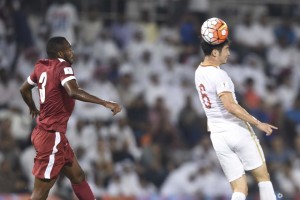
Abdelrakim Hassan in action against China in World Cup qualification
Unfortunately, their route through the tournament proper will be far from easy as group games with Qatar, Syria and Iran await. Seeding for the tournament was based on performance in the 2014 edition and so China found themselves in pot 4 after losing all three of their games two years ago to Iraq, Saudi Arabia and Uzbekistan.
The first game will be against Qatar on Tuesday. Although the hosts didn’t actually qualify for 2014’s tournament, they have a surprisingly good record in youth tournaments and this squad features many of those who won the 2014 AFC under-19s championship.
The Qataris are always tough to beat at home, as the senior Chinese team found out at the 2011 Asian Cup and this past October. Aside from Belgian based pair Ahmed Moein and Akram Afif who both played key roles in Qatar’s under-19 success, China should be wary of two players who are regulars in the full national team. Marauding left-back Abdelkarim Hassan already has 41 senior caps and has looked a constant attacking threat during World Cup qualification, while Ghanaian born striker Mohammed Muntari didn’t play against China, but has managed four goals in qualifying so far.
Three days after facing Qatar, China take on a Syria side that should not be underestimated. Despite all the upheaval the Syrians have been facing at home, their international football teams have performed remarkably in recent years with the under-23s making it to the quarter-finals of the last edition of this tournament and the senior team on the verge of making it to the final round of World Cup qualification.
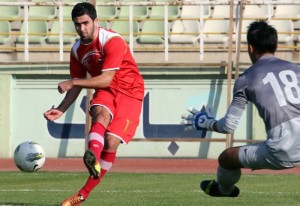
Syria’s Omar Kharbin will be a serious threat to China’s defence
With eleven goals in 25 senior team appearances, 21-year-old striker Omar Kharbin is certainly one to watch. Attacking midfielder Mahmoud Al Mawas has also been a regular in the senior team’s World Cup qualification campaign that has seen them pick up five wins from six games.
China then round out their group matches with a game against Iran next Monday. Although the Iranians are Asian heavyweights at senior level, they failed to get out of the group stage in 2014 and only qualified for this tournament as best runners-up behind Saudi Arabia. To make matters worse for Team Melli, they will be missing several key players including star attacker Sardar Azmoun.
The 21-year-old’s Russian club Rostov refused to let him go for the tournament and Iran will also be missing injured midfielder Ahmad Nourollahi among others. In their absence, Naft Tehran attacker Amir Motahari will be expected to pick up the slack, but Iran could actually prove to be the weakest of China’s three group stage opponents.
Prospects
Should Fu Bo’s young men make it through the group, they will likely face Saudi Arabia, Japan or North Korea in the quarter-finals. With the Saudis and Japan being among the favourites for the competition and North Korea generally doing suspiciously well in age limited tournaments, China are serious underdogs to make it as far as the semi-finals and to possible Olympic qualification.
The Chinese making it to Rio would be a legitimate cause for optimism regarding the future of Chinese football. What may have to be settled for, though, is a competent showing in the group stages that may or may not lead to a quarter-final birth.
What is most important is that China’s players demonstrate an ability to handle pressure that their senior counterparts have been lacking for years. This includes the ability to look comfortable in possession, demonstrate patience in build-up play, pass confidently out of defence and take chances when they are presented.
If this crop of Chinese players can go someway towards doing that, than the future may just be a little bit brighter regardless of who replaces Perrin. Anything else they achieve would be a welcome bonus.
Full Squad
Goalkeepers: Du Jia (Tianjin TEDA), Zhang Yinuo (Shanghai Shenxin), Yeerjieti Yeerzati (Gondomar)
Defenders: Mi Haolun, Wang Tong, Chen Zhechao (all Shandong Luneng), Jin Yangyang (Guangzhou R&F), Shi Ke (Shanghai SIPG), Zhang Xiaobin (Jiangsu Sainty)
Midfielders: Liao Lisheng, Xu Xin, Li Yuanyi (all Guangzhou Evergrande), Liu Binbin, Wu Xinghan (both Shandong Luneng), Feng Gang, Zhao Yuhao, Xie Pengfei (all Hangzhou Greentown), Wang Qiumin, Guo Hao (both Tianjin TEDA) Yang Kuo (Henan Jianye), Chang Feiya (Guangzhou R&F)
Forwards: Zhang Yuning (Vitesse Arnhem), Yang Chaosheng (Guangzhou Evergrande)
Fixtures
China vs Qatar 00:30 Wednesday January 13th (Tuesday Night)
China vs Syria 21:30 Friday January 15th
China vs Iran 00:30 Tuesday January 19th (Monday Night)
